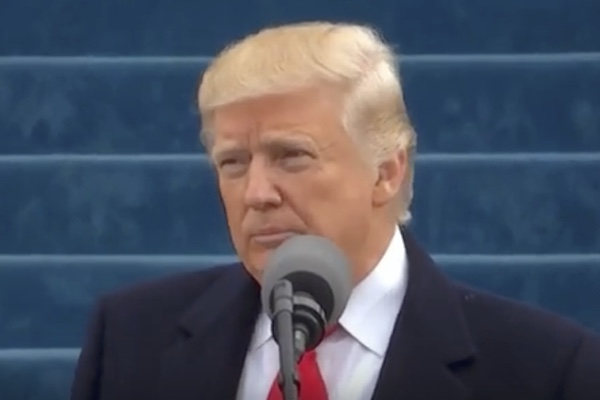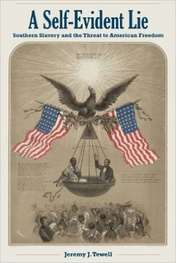Lincoln Viewed the Civil War as a Struggle for Majority Rule. Today a Minority Governs.

On January 20, 2017, Hillary Clinton listened as President Donald Trump characterized his first day in office as “the day the people became the rulers of this nation again.” As Trump would no doubt like to forget, the people who voted for Clinton (or, more accurately, for electors pledged to her) outnumbered those who voted for him by nearly three million. Indeed, it may be wondered whether a system that awards the presidency to Trump, in spite of his rejection by the people, can truly be considered a democracy.
 The conflict between
our political ideals and our system of government was evident in
Abraham Lincoln’s political life. At Gettysburg Lincoln famously
defended the war for the Union as an effort to ensure that
“government of the people, by the people, for the people, shall not
perish from the earth.” As slaveholding states seceded in response
to Lincoln’s election as president in 1860, northerners attributed
the Republican victory to the will of the people. If a minority could
refuse to accept the results of an election, majority rule would
become an untenable proposition. Secession would prove to the world
that the American experiment in popular government had been a
failure, and that democracy simply did not work. Northerners
dismissed the southern position that the South had suffered “a long
train of abuses and usurpations” that justified the withdrawal of
their consent to be governed. There certainly was no constitutional
right to secede. Secession was, rather, “the essence of anarchy,”
as Lincoln argued in his first inaugural. Those who rejected majority
rule, “of necessity, fly to anarchy or to despotism.” “Unanimity
is impossible,” he explained, “the rule of a minority, as a
permanent arrangement, is wholly inadmissible; so that, rejecting the
majority principle, anarchy, or despotism in some form, is all that
is left.”
The conflict between
our political ideals and our system of government was evident in
Abraham Lincoln’s political life. At Gettysburg Lincoln famously
defended the war for the Union as an effort to ensure that
“government of the people, by the people, for the people, shall not
perish from the earth.” As slaveholding states seceded in response
to Lincoln’s election as president in 1860, northerners attributed
the Republican victory to the will of the people. If a minority could
refuse to accept the results of an election, majority rule would
become an untenable proposition. Secession would prove to the world
that the American experiment in popular government had been a
failure, and that democracy simply did not work. Northerners
dismissed the southern position that the South had suffered “a long
train of abuses and usurpations” that justified the withdrawal of
their consent to be governed. There certainly was no constitutional
right to secede. Secession was, rather, “the essence of anarchy,”
as Lincoln argued in his first inaugural. Those who rejected majority
rule, “of necessity, fly to anarchy or to despotism.” “Unanimity
is impossible,” he explained, “the rule of a minority, as a
permanent arrangement, is wholly inadmissible; so that, rejecting the
majority principle, anarchy, or despotism in some form, is all that
is left.”
This argument, however, was not entirely seamless. Like many presidents before and after him, Lincoln received the most votes, but did not win a majority. And even if plurality rule is a sufficient substitute for majority rule, it remained quite possible for a president to take office without having received the most votes from the people. Lincoln himself would likely have fallen into that category had he faced a united opposition. It is therefore unsurprising that, taken together, his statements on the American system of government, delivered both before and during the war, betrayed the reality that our Constitution imperfectly reflects the people’s will. While he clearly spoke of a majority of the people in his first inaugural, his first message to Congress, written four months later, portrayed the United States as “a constitutional republic, or a democracy.” The war presented the question whether “a government of the people” could defend itself against “discontented individuals, too few in numbers to control administration, according to organic law [i.e., the Constitution].” A portion of the people could be “too few” to control the government, but this did not mean they had to constitute a majority or a plurality. Shortly before he issued the Preliminary Emancipation Proclamation, he reminded two antislavery clergymen that it was “constitutional government,” not majority government, that was at stake.
Sixteen years earlier, the defense of majority rule was far less urgent. Not unlike those who blame Ralph Nader for Al Gore’s loss in 2000, or Jill Stein for Hillary Clinton’s loss in 2016, Lincoln blamed a third-party candidate, James G. Birney of the Liberty Party, for Henry Clay’s loss in 1844. Many Whigs, including Lincoln, complained that, by voting for Birney, the antislavery Whigs of New York had made their idea of perfect the enemy of good. James K. Polk carried the country by only 38,000 of 2.7 million votes cast. He won New York by only 5,106. If Birney’s 15,814 votes in that state had gone to the Whigs, Lincoln concluded, “Mr. Clay would now be president, Whig principles in the ascendant, and Texas not annexed; whereas by the division, all that either had at stake in the contest, was lost.”
Lincoln’s counterfactual assessment may have been flawed. In reality, it was Clay’s wavering on the Texas question that probably cost him New York. Furthermore, unlike Gore and Clinton, Clay would have lost the national popular vote (albeit narrowly) even if he had won New York, and with it the presidency—a state of affairs that seems not to have concerned Lincoln.
As a member of the House of Representatives in 1848, while maintaining that Congress best understood the popular will, Lincoln conceded that the president “is elected by them [the people], as well as congress is.” Lincoln had been a Whig candidate for presidential elector in Illinois in 1840 and 1844, and would be again in 1852. (Given that Illinois was a solidly Democratic state, he never had a chance to actually cast an electoral vote.) He was certainly aware that the framers of the Constitution had given the power to elect the president to electors chosen by the state legislatures and not to the people. Yet by 1832—sixteen years before Lincoln addressed Congress on the issue—every state but South Carolina provided for the popular election of electors, a development that created the persistent misconception, or illusion, that the American people elect their president.
Today that illusion is beginning to crumble. The Electoral College has defied the will of a plurality of American voters for the second time in only sixteen years. Despite acting as the representative of the nation as a whole, the president is elected on the same basis as Congress, with each state receiving a number of electors equal to the total number of its senators and representatives, and each (with the exception of Maine and Nebraska) holding a separate winner-take-all election to determine its preferred presidential candidate. In any election for a deliberative body (which the founders intended the Electoral College to be), a political party can win more votes overall and yet find itself a minority if the other party wins more seats but by smaller margins. For example, more Americans voted for Democratic Senate candidates than for Republican candidates in 2016; yet Republicans won 22 out of the 34 seats up for election. Thus the current workings of the Electoral College, with the division of a national election into fifty state elections (plus Washington, D.C.), transfer that potential disparity to the executive branch.
Under Lincoln, democratic government prevailed, with emancipation serving as both a means to that end as well as an end in itself. Over a century and a half later, our new president took his oath on the same Bible Lincoln used and noted that “what truly matters is not which party controls our government, but whether our government is controlled by the people.” This is a laudable sentiment. It would therefore behoove the American people to consider whether our Constitution has allowed minority rule to become too common to be admissible